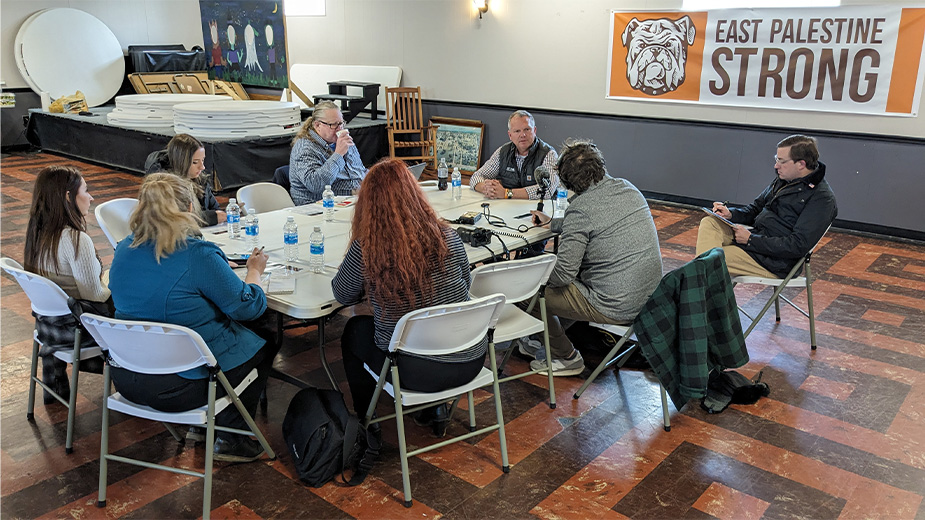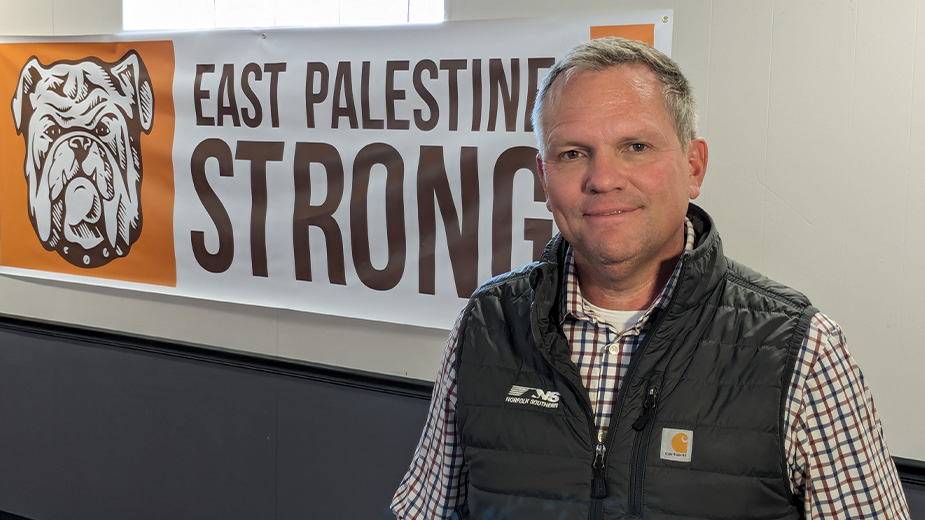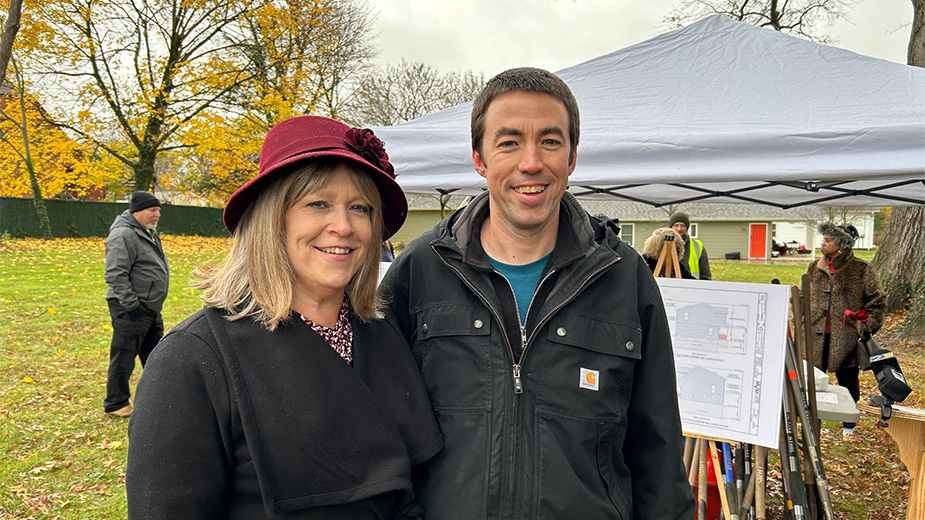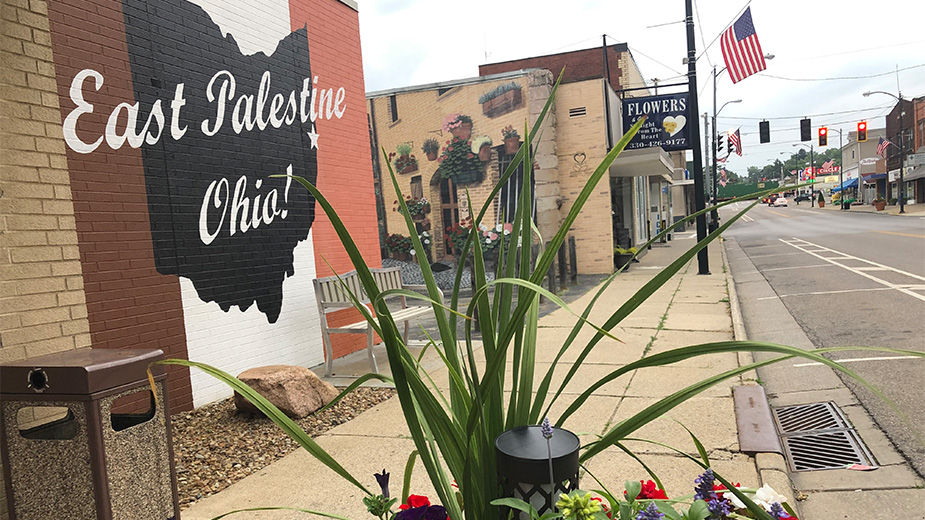CEO: Norfolk Southern in East Palestine for the Long Haul
EAST PALESTINE, Ohio – Nearly a year since the train derailment in the village, Norfolk Southern CEO Alan Shaw said he is happy with the company’s $100 million response and it will continue to be here for the long haul.
Shaw sat down with members of the media Monday at the East Palestine Moose Lodge, a block south of the railroad tracks.
As the remediation efforts have mostly ended at the site of the derailment, about a mile away, work continues to backfill the site where contaminated soil and debris were removed. There are fewer Norfolk Southern employees working in town, but Shaw sees a continued presence by the railroad in the future.
“From Day One, we were pretty clear we were going to do what was right for East Palestine, and we were going to do more than less,” Shaw said. “And that included the environmental remediation … remediating the site safely and thoroughly; and we were going to invest in the community long-term; and we were going to help the community thrive.”
Shaw’s visits to the village started in the beginning, and he has continued to come several times a month to talk to the community. Long-term assistance includes a $4.3 million investment to upgrade the village water system, a Home Value Assurance Program. Shaw says only about nine homeowners have used the program out of 72 homes sold as home values have increased.
Shaw said he is encouraged that the vast majority of residents have returned to their homes, although 50 families have not, according to the Norfolk Southern Family Assistance Center.
Outside of East Palestine, the railroad has paid $4.2 million to Pennsylvania communities to support local agencies and grants for nonprofits.
Shaw said it was important to listen to residents.
“Since Day One we’ve made a lot of promises, and we’ve kept our promises,” Shaw said. “And we understand there is more to be done.”
‘They’ve Taken Responsibility’
While there are some in the small town of 4,800 who are ready to see the derailment behind them, Mayor Trent Conaway said Monday he is happy to see Norfolk Southern continue to work with the village.
“Absolutely,” Conaway said. “They’ve taken responsibility for what they’ve done and helped the village. They’ve been good partners.”
The one exception, according to Conaway, is when the railroad quickly built rails over the contaminated dirt so trains could resume moving through town.
“We called them on that,” Conaway said, adding Norfolk Southern has since spent months fixing that problem. Currently, the work happening at the site is mostly to backfill with stone and gravel where tons of contaminated soil was removed. According to the latest figures released by the Environmental Protection Agency, 176,445 tons of solid waste has been shipped from the site, along with 42.7 million gallons of wastewater, and more than 30% of the sampling work to confirm the contamination is gone is complete.
Shaw talks about having no regrets, including the controversial controlled release and burn of vinyl chloride that rose about East Palestine as a large mushroom cloud. On Monday, he reiterated that the incident commander, fire Chief Keith Drabek, made the final decision, but Norfolk Southern was involved and believed it to be the best option over a potential uncontrolled explosion.
For Shaw, there is no time line, and when pressed about how they will help long-term should anyone develop health issues, Shaw suggested they are working with state and local partners to make a plan. But if anyone should develop a problem, they can go to their own trusted physician or the health clinic the company helped set up with East Liverpool Hospital. He said Norfolk Southern will pay for the costs.

Additionally, Norfolk Southern continues to invest in safety, including adding additional hotbox detectors to detect faulty wheel bearings, which was the cause of the derailment listed in the preliminary report by the National Transportation Safety Board. Shaw pointed out that the railroad did not own the railcar. It was owned by the customer, which points to a need for industrywide solutions, Shaw said.
He said two of the many new hotbox detectors were installed to the east and the west of East Palestine. Additionally, he pointed to the Train Inspection Portals being added over many years to the railroad lines with their partners from the Georgia Tech Research Institute. One was installed in nearby Leetonia, and it is capable of taking thousands of photos of each train car as it passes through. The same technology is used by the department of defense to analyze rockets.
Shaw said in 2023 the number of mainline accidents declined over 40% compared with 2022. He believes pushes for additional safety continue to work, but there are still efforts the railroad is making to improve.
“We said we were going to make a safe railroad safer, and we did,” Shaw said, adding he wants to see Norfolk Southern become the safety gold standard in the railroad industry.
Although Norfolk Southern has been criticized for implementing precision schedule railroading, which in part helps to control costs and manage people, that program was not to blame for the accident, Shaw said. He pointed again to the decline in accidents.
“What I hear from the community now is really a discussion about resiliency and recovery,” he said. “And the folks in the community are really intentional about taking all that energy and applying it in a positive direction forward.”
Investments
Going forward, the railroad is investing $25 million in a park project. Conaway said he expects the first phase of that project to begin this winter, which will create new courts for tennis, pickleball and basketball. After that, the new pool and pool house will be built. As of now, Conaway said the village will not be without a pool in the summer season. He emphasized the importance of protecting children at the pool.
Another $25 million will be put into constructing the First Responder Assistance Center to train first responders and help the community economically by those coming into the community to train there.
The railroad has invested $500,000 into funding economic development, which has led to the village hiring Mike Jacoby, an economic development consultant with Bricker Graydon in Cleveland, to help businesses. Conaway described Jacoby as a “value asset to the community.”
When winter ends, Conaway sees Norfolk Southern working on the sheen reported by the Ohio EPA in Sulphur Run and Leslie Run. The railroad has cleaned five culverts downtown and may be pushed to do additional remediation work if more contamination is found.
Norfolk Southern is also renovating a building purchased downtown, where the Family Assistance Center will move and a field office will be added. Some local Norfolk Southern employees will be working in that facility.
“I’m glad they bought the building and they’re going to have a face here,” Conaway said of the long-term future partnership with the railroad. “They are contributing to the village, and it’s going to be nice to have local faces there.”
Pictured at top: Norfolk Southern CEO Alan Shaw visited East Palestine on Monday.
Copyright 2024 The Business Journal, Youngstown, Ohio.



